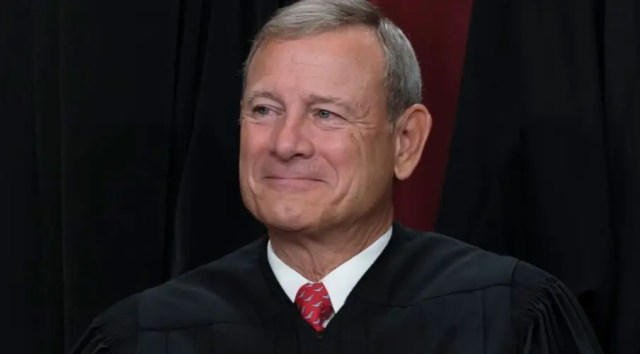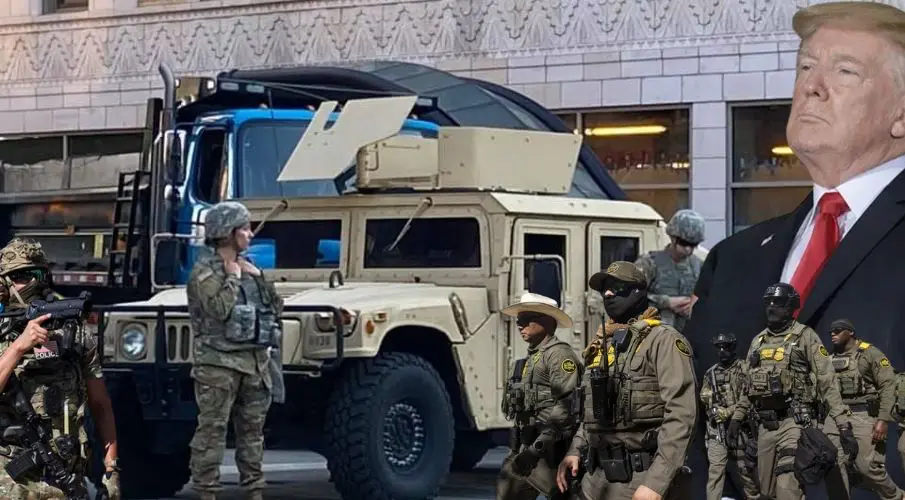It was a morning like many others in Washington - and yet one in which the very foundations of American democracy trembled. While the venerable Supreme Court opened its new session, in which it will deal with nothing less than presidential immunity, the limits of federal power, and the core of the separation of powers, another chapter of history was beginning in Illinois - one that smelled of tear gas.
Governor JB Pritzker did not wait an hour to condemn the president’s decision to send 400 members of the Texas National Guard to his state. “This is not a security measure,” Pritzker said. “This is Trump’s invasion.” The president, the Democrat continued, was abusing military power to enforce political messages - against the will of the states, against the federal constitution.
In the streets of Broadview, a suburb west of Chicago, a scene was unfolding that served as a warning sign for this new era. Dozens of demonstrators gathered in front of an Immigration and Customs Enforcement facility to protest the ongoing deportations and the growing militarization of domestic affairs. What happened next is documented in videos, screams, and the lingering sting of pepper spray.
The case of Kat Abughazaleh, former journalist and now Democratic congressional candidate for Illinois’s ninth district. She had come that day, on September 20, 2025, to speak peacefully with protesters when federal officers suddenly fired tear gas, launched pepper balls, and slammed Abughazaleh to the ground. One activist was even dragged into the building while witnesses filmed her shouting, “We are unarmed!”
Abughazaleh later reported that she had been “hit, slammed to the ground, and repeatedly kicked” before being held for several minutes. She spoke of an attack on the fundamental right to political participation - an attack that symbolized the state of America itself. “When peaceful protest is declared an act of war,” she said, “it is no longer the people who are sovereign, but violence.” The consequences of the attack are still being felt today.
Governor Pritzker reacted angrily. “I call on Governor Abbott to withdraw all support for these operations immediately.” He called it an “unconstitutional intrusion” into the sovereignty of the states. That Trump’s Department of Defense had mobilized the National Guard from other states to conduct operations in Illinois and Oregon without the consent of the affected governors, Pritzker called “an unprecedented abuse of power.”
At the same time that troops from Texas were on their way to Illinois, the Supreme Court in Washington opened its doors. Chief Justice John Roberts, for two decades the tactful face of an increasingly divided institution, entered the chamber with the stoic expression of a man who knows that the coming months will be his hardest yet.

On the agenda for the new session are cases that could redefine the relationship between the executive and the legislature. The most important among them: the question of whether a president - contrary to the Constitution - can use military force domestically over the will of individual states. It is a dispute over the basic idea of America - the separation of power. Trump, who presents himself as the “law and order president,” is testing that separation in unprecedented ways. Under the pretext of protecting federal officials and facilities, he moves troops from state to state as if the country belonged to him alone. In Oregon, that attempt has already been stopped - Judge Karin Immergut, ironically a Trump appointee herself, issued a second temporary restraining order over the weekend that prohibits any further deployment of National Guard troops to Oregon.

But Illinois remains another battlefield. The first troops are already on their way there. The president is invoking Section 12406 of Title 10 of the U.S. Code, which allows the use of the National Guard when laws can no longer be enforced. But nowhere in Illinois is the republic burning. There are no uprisings, no threats to public order. Only protests - and a woman who was slammed to the ground for daring to question the use of that power.
What is taking shape here is more than a political conflict. It is a test for the institutions - a moment in which the Supreme Court, the governors, and civil society must all examine whether American democracy still knows where its boundaries lie. On Sunday evening, a few dozen demonstrators in front of the ICE building cheered when they heard of Immergut’s decision in Oregon. “For the first time in weeks, I feel like the law still matters,” one of them said.
A sentence that means more than it sounds. Because in a country where a presidency seeks to merge law and violence, every sentence affirming the validity of the law is already an act of resistance. As the Supreme Court continues its sessions and Illinois braces for possible further confrontations, one question remains: Who will protect America from its own commander in chief? And how much longer can a democracy survive when its defenders are knocked to the ground with pepper balls?
Investigative journalism requires courage, conviction – and your support.
Please also strengthen our journalistic fight against right-wing populism and human rights violations. We do not want to finance ourselves through a paywall so that everyone can read our research – regardless of income or origin. Thank you very much!


„… während im ehrwürdigen Supreme Court…“
Das klingt wie der reinste Hohn, wenn man sich all die pro Trump, gegen Volk und Demokratie ansieht.
Der Supreme Court ist zumindest mit 6 Richtern, nur noch eine Marionette der Trump Regierung.
Nicht mehr in der Lage dem Druck stand zu halten und Urteile zu fällen, tells ohne Begründung, die nicht der Verfassung entsprechen.
Vom Supreme Court kann nur Trump was positives erwarten, niemand sonst.
Das werden die nächsten Urteile wahrscheinlich deutlich zeigen.
Und was dann?
Was sind die Urteile der darunter liegenden Instanzen dann noch wert?
Wenn klar ist, dass der Supreme Court die Urteile kippt und Grundsatzurteile fällt, die Klagen gegen die faschistische Regierung immer weiter einschränkt.
Verfassungsmäßige Rechte einschränkt
Dem Präsidenten quasi uneingeschränkte (diktatorische) Macht gibt.
Was dann?
Vor Gericht kann man „das“ dann nicht mehr aufhalten.
Entweder das Militär stellt sich noch rechtzeitig auf die Seite der Demokratie oder es gibt einen blutigen Bürgerkrieg.
Der aber, wenn das Militär auf der Seite der Faschisten steht, nicht von der Demokratie gewonnen werden kann.
Es sind wahrlich düstere Aussichten.
schritt für schritt denken wir hier, bisher konnte man vor gericht viel erreichen, der supreme kann diese route nicht dauerhaft weitergehen, dann holen andere richter diesen 6er club der korrupten von den stühlen